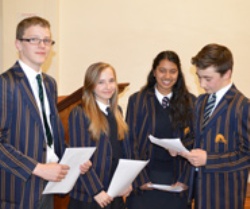Apr 24 2013
A successful project to educate school pupils across Bristol and South Gloucestershire about nanotechnology has climaxed in a debate about whether the manipulation of very small particles could be the answer to the world’s energy problems.
 Four Year 10 pupils at Colston’s School proposed the motion that nanotechnology is the answer to the world’s energy problems (left to right Josh Callaway, Megan Long, Neha Seegum and Luke Wilmott).
Four Year 10 pupils at Colston’s School proposed the motion that nanotechnology is the answer to the world’s energy problems (left to right Josh Callaway, Megan Long, Neha Seegum and Luke Wilmott).
The potential uses for these tiny nanoparticles - so small that a nanometre is 50,000 times smaller than the width of a human hair – are far-reaching and experts predict it will have a big impact on our lives in the future.
This futuristic technology has captured the imagination of Year 10, 11 and 12 pupils at four local schools through the NanoX project, being run by the University of Bristol and Colston’s School.
A total of 27 PhD students from the Bristol Centre for Functional Nanomaterials [BCFN] have been working with pupils at Colston’s, Winterbourne International Academy, Cabot Learning Federation and St Mary Redcliffe and Temple to bring nanoscience research to life in the classroom.
A series of demonstrations, lectures and online discussions has culminated in two debates between the participating schools about the risks and benefits that nanotechnology brings to society.
Although it may be able to create many new materials and devices with a vast range of applications, such as in medicine, electronics, biomaterials and energy production, there are also concerns about the toxicity and environmental impact of nanomaterials, their potential effects on global economics, as well as speculation about various doomsday scenarios.
These issues came under the spotlight at a public debate yesterday [18 April] when teams from Colston’s School and Cabot Learning Federation debated whether nanotechnology was the answer to the world’s energy problems.
There will be a second debate later in the year between pupils from St Mary Redcliffe and Temple and Winterbourne International Academy.
Dr Annela Seddon, Teaching and Research Fellow in the BCFN and Lecturer in the School of Physics, said: “Nanotechnology is a subject which really captures people’s imagination and it’s been great to see how passionate school children are about the subject and how it affects the world we live in.
“It’s been around for longer than you might expect - we’ve seen it in Egyptian make-up and Roman glassware, but it’s only now that we have the tools to understand objects this small and are able to manipulate them. They can potentially have huge social and economic impact, such as treating cancer and delivering nutrients to crops but the big question is whether it’s safe.”
Dr Paul Hill, Deputy Head (Academic) of Colston’s School, has led the project and hopes it will inspire youngsters to pursue a career in science or technology.
He said: “The NanoX project has been a fantastic opportunity for pupils from across Bristol and South Gloucestershire to explore the exciting field of nanotechnology. They have particularly benefited from working closely with postgraduate students, researching and debating the benefits and risks of nanotechnology, co-authoring articles for our publication and preparing for the live debates. Many of them have been inspired by this project to find out more about careers in science and technology."
A new magazine, featuring articles by the school pupils and PhD students involved in the project, will bring the subject to life using augmented reality. It’s set to be distributed to schools throughout the South West to promote interest in nanotechnology.
Source: http://bristol.ac.uk/